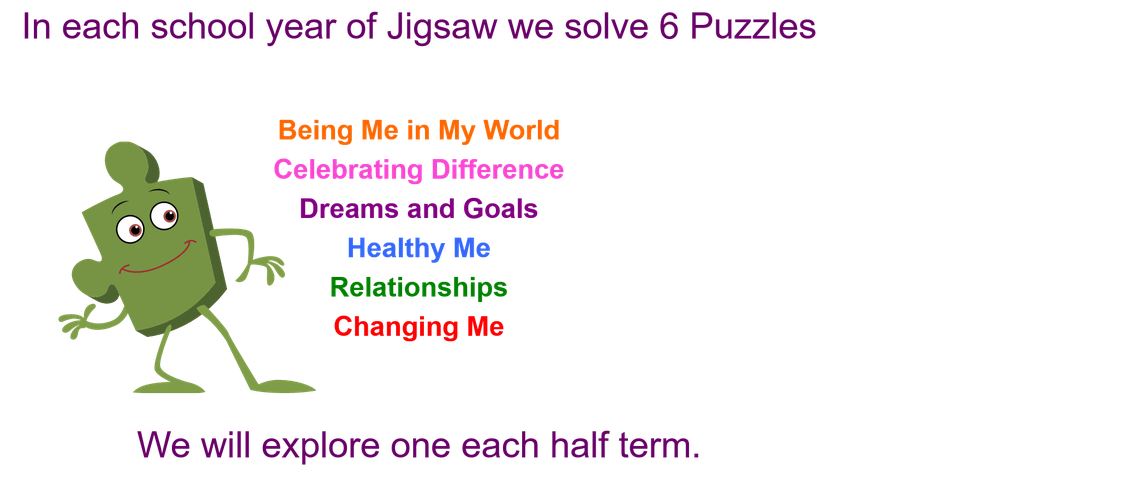PSHE
Curriculum Intent
The Jigsaw scheme offers a whole-school approach to PSHE, supporting the development of social and emotional skills essential for everyday life. This mindful curriculum helps children lead happy, healthy lives, nurturing their well-being while fostering a strong sense of support and care within the school community. Each term focuses on six key topics—Being Me in My World, Celebrating Difference, Dreams and Goals, Healthy Me, Relationships, and Changing Me—providing a spiral curriculum where prior knowledge is revisited and built upon as students move through the school. This ensures continuous growth as they explore who they are, understand their own emotions, and develop social skills. Every lesson follows a structured format: recap, calm-me-time, teaching, pause and reflect, and closure. This approach ensures children are not only engaged in learning but also have time to reflect on and absorb the content. Each lesson incorporates clear learning objectives, keywords, and a mix of small and large discussions, supported by visuals and Jigsaw characters to meet the diverse needs of our learners. Term 2 (Celebrating Difference) and Term 5 (Relationships) provide particularly rich opportunities for children to explore their own identity and understand the world around them, encouraging confidence, resilience, and respect for others. By the end of their journey through the Jigsaw programme, students are empowered to be lifelong learners who are confident in their ability to engage with their community, set and achieve personal goals, and respect and celebrate the differences that make each person unique. Ultimately, the curriculum equips children with the knowledge, skills, and emotional tools they need to thrive in all aspects of life.
What is PSHE Education?
PSHE Education (Personal, Social, Health and Economic Education) is a planned programme of learning through which children and young people acquire the knowledge, understanding and skills they need to successfully manage their lives – now and in the future. As part of a whole-school approach, PSHE Education develops the qualities and attributes pupils need to thrive as individuals, family members and members of society.
What do schools have to teach in PSHE Education?
According to the National Curriculum, every school needs to have a broad and balanced curriculum that:
- Promotes the spiritual, moral, social, cultural, mental and physical development of pupils at the school;
- Prepares pupils at the school for the opportunities, responsibilities and experiences of later life;
- Promotes British values.
From September 2020, primary schools in England also need to teach Relationships and Health Education as compulsory subjects and the Department for Education strongly recommends this should also include age-appropriate Sex Education.
Schools also have statutory responsibilities to safeguard their pupils (Keeping Children Safe in Education, DfE, 2019) and to uphold the Equality Act (2010).
What is Jigsaw, the mindful approach to PSHE, and how does it work?
Jigsaw is a whole-school approach and embodies a positive philosophy and creative teaching and learning activities to nurture children’s development as compassionate and well-rounded human beings as well as building their capacity to learn.
Jigsaw is a comprehensive and completely original PSHE Education programme (lesson plans and teaching resources) for the whole primary school from ages 3-11 (12 in Scotland). Written by teachers and grounded in sound psychology, it also includes all the statutory requirements for Relationships and Health Education, and Sex Education is also included in the Changing Me Puzzle (unit).
Jigsaw has two main aims for all children:
- To build their capacity for learning
- To equip them for life
Jigsaw brings together PSHE Education, compulsory Relationships and Health Education, emotional literacy, mindfulness, social skills and spiritual development. It is designed as a whole school approach, with all year groups working on the same theme (Puzzle) at the same time at their own level. There are six Puzzles (half-term units of work) and each year group is taught one lesson per week. All lessons are delivered in an age- and stage-appropriate way so that they meet children’s needs.
Each Puzzle starts with an introductory assembly, generating a whole school focus for adults and children alike. There is also a Weekly Celebration that highlights a theme from that week’s lesson across the school encouraging children to live that learning in their behaviour and attitudes.

